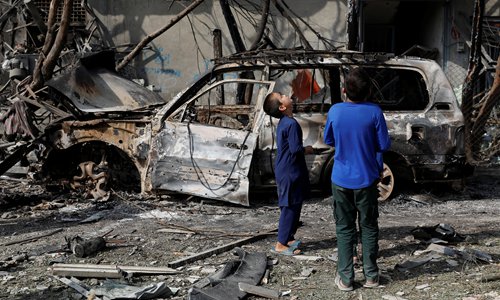HOME >> WORLD
Death toll from attack on Afghan VP candidate’s office rises to 20
Source:AFP Published: 2019/7/29 20:53:41

Boys stare at the site of Sunday's attack in Kabul, Afghanistan on Monday, a day after a deadly assault targeting a political campaign office. Deadly violence marred the start of the Afghanistan election season on the weekend after President Ashraf Ghani insisted "peace is coming" to the war-torn nation. Photo: VCG
The death toll from a suicide attack on the Kabul office of Amrullah Saleh, Afghan President Ashraf Ghani's running mate in September elections, reached 20 with at least 50 wounded, officials said on Monday as cleanup operations began.Saleh, a former intelligence chief and security adviser who is running for vice president with Ghani, was slightly wounded in Sunday's attack on the office of his Green Trends party in central Kabul.
No group has so far claimed responsibility for the attack, which came at the start of official campaigning for presidential elections scheduled for September 28.
Zalmay Khalilzad, the veteran Afghan-American diplomat who is leading the US side in peace negotiations with the Taliban, condemned Sunday's attack and said the perpetrators must be brought to justice.
"The attack on Amrullah Saleh's political party offices was grotesque and a clear act of terrorism," he said on Twitter.
Already delayed twice this year, the elections are likely to prove a severe organizational and security test for Ghani's government, which came to power in 2014 following a bitterly fought campaign and a poll marred by accusations of widespread fraud.
Sunday's attack added to an anxious mood in Kabul, where there is concern over chaotic election preparations and uncertainty about the future of US military support for the Afghan government.
US diplomats have been talking with the Taliban for months to agree a timetable for the withdrawal of foreign forces in exchange for security guarantees. The talks are expected to resume early next month amid increasing expectations that the two sides are close to an agreement.
Ghani declared on Sunday that peace was coming but he has so far been excluded from the talks because of the Taliban's refusal to negotiate with a government it considers a foreign-appointed "puppet" regime.
The attack in central Kabul - a virtual fortress of concrete blast walls, razor wire and police checkpoints - underlined how difficult it will be to maintain security during the election campaign, with government control slipping across the country.
RELATED ARTICLES:
Posted in: CENTRAL & SOUTH ASIA,WORLD FOCUS